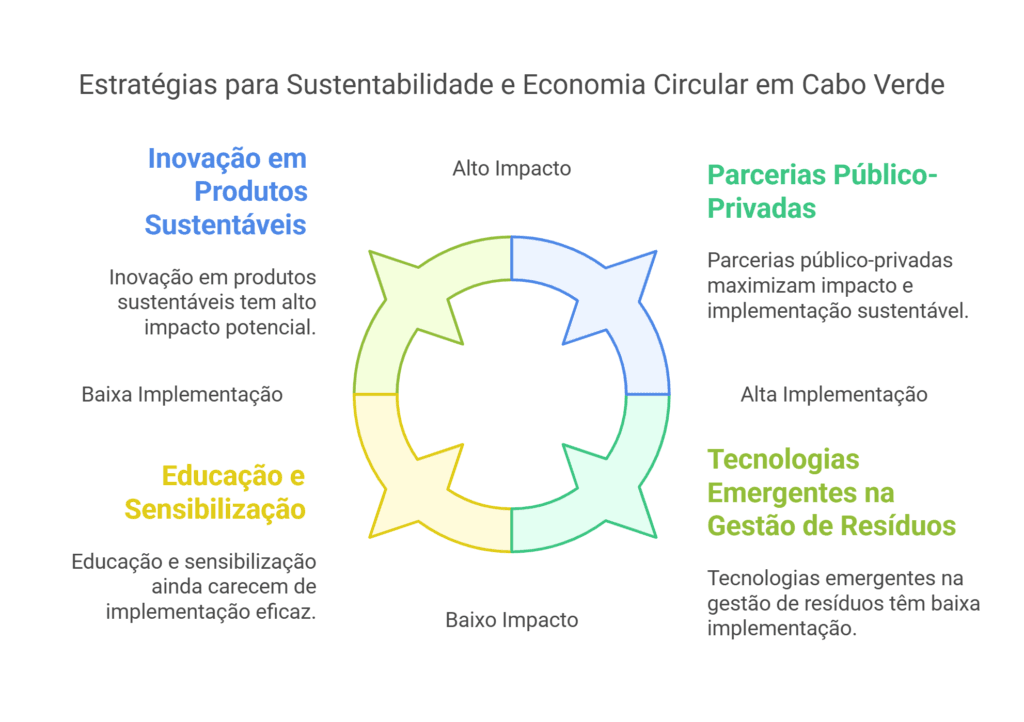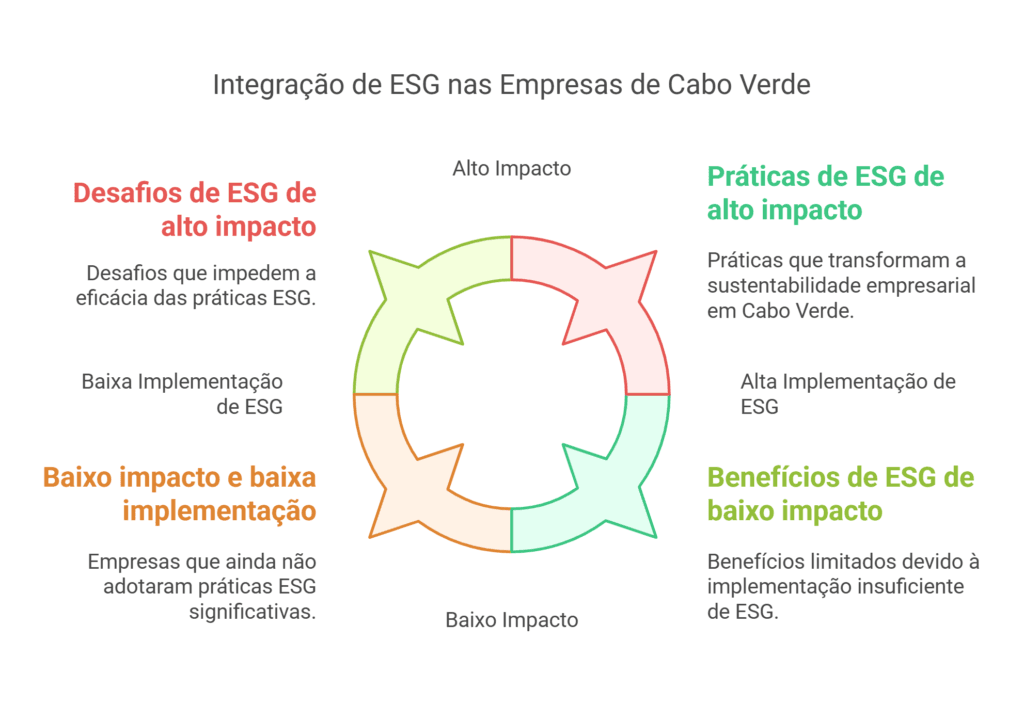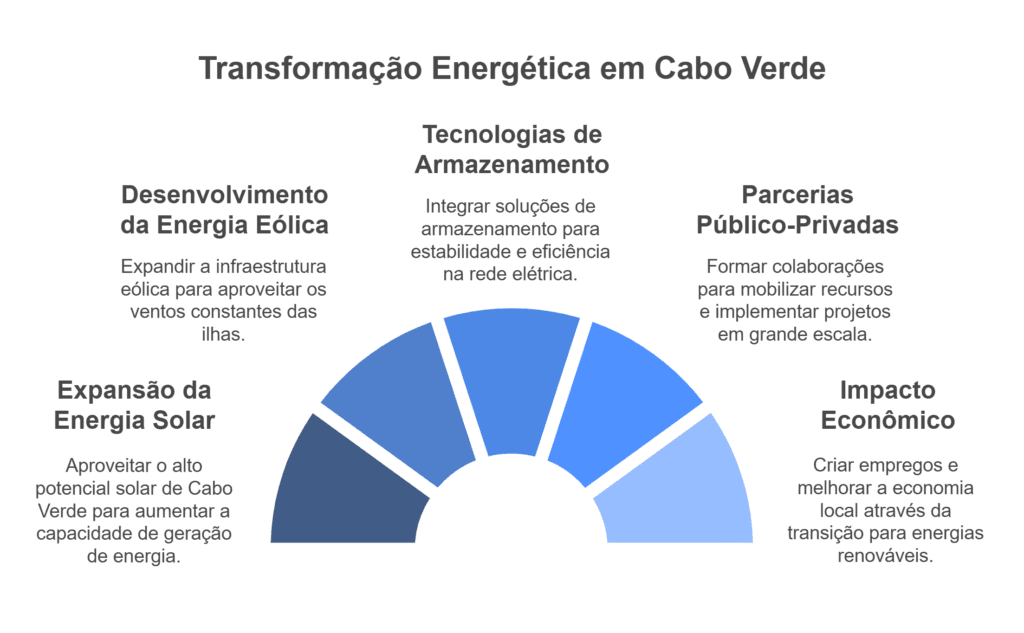

Environmental management has become an essential pillar for sustainable development in Cape Verde, a country that faces significant challenges due to its geographical location and limited natural resources. With the growing pressure of climate change and the need to preserve biodiversity, Cape Verdean companies are being encouraged to adopt more sustainable practices to ensure their long-term resilience and competitiveness.
Cape Verde has been emerging as a strategic point for investments in sustainability, with sectors such as renewable energies and sustainable tourism offer significant opportunities for innovation and growth. The implementation of circular economy practices, such as the reuse and recycling of materials, is seen as a viable solution to waste management, one of the archipelago's most pressing environmental challenges.
The Cape Verdean government, through initiatives such as the National Adaptation Plan (NAP)has been promoting the integration of climate considerations into the country's development plans. This commitment is reinforced by the National Strategy for Sustainable Development 2022-2030, which encourages companies to adopt ecological and socially responsible practices, in line with the country's Sustainable Development Goals (SDGs).
In addition, the adoption of ESG (Environmental, Social and Governance) practices is gaining prominence as a crucial competitive factor. Companies that prioritise sustainability not only reduce operating costs, but also improve their brand image and attract consumers and investors who value environmental commitment. This movement is supported by reports such as the Cape Verde Country Climate Development Report (CCDR)which provides integrated guidelines for sustainability and inclusive development.
In this context, the transition to a greener and more digital economy not only mitigates environmental challenges, but also positions Cape Verde as a regional leader in sustainable innovation. Companies that adopt adaptive and innovative strategies will be well placed to thrive in a competitive and constantly evolving environment.
Contents
The circular economy is an innovative approach that aims to minimise waste and maximise the reuse of resources, creating a more sustainable production cycle. In Cape Verde, implementing circular economy practices is crucial to tackling the country's environmental and economic challenges. Reusing materials and recycling waste are key strategies for transforming by-products into new resources, reducing production costs and increasing companies' operational efficiency. Studies indicate that the circular economy can reduce production costs by up to 20% (Ellen MacArthur Foundation).
Strengthening local value chains is an essential strategy for the sustainable growth of small businesses in Cape Verde. By focussing on developing local suppliers and promoting regional partnerships, companies can reduce dependence on imports and increase economic resilience. This strategy can also stimulate local employment and promote skills development. For example, the agricultural sector can benefit from the creation of co-operatives that facilitate access to markets and resources, promoting a more sustainable and efficient economic cycle (FAO).
Innovation is a crucial driver for business sustainability. In Cape Verde, creating sustainable products and services can differentiate small businesses and increase their competitiveness in the global market. The adoption of green technologies and innovation in durable product design are effective strategies for minimising waste and promoting the circular economy. Modularity and dematerialisation are examples of innovative practices that can be adopted to extend the useful life of products and reduce the need for frequent replacements (Economath).
Public-private partnerships (PPPs) offer a valuable platform for implementing large-scale sustainability projects in Cape Verde. These partnerships can facilitate access to funding and advanced technologies, promoting innovation and efficiency in waste management. Collaboration between the government, the private sector and civil society organisations is key to overcoming environmental and economic challenges, creating an environment conducive to sustainable growth (World Bank).
Education and awareness-raising are essential components for the transition to a circular economy in Cape Verde. The promotion of sustainable practices and ongoing training for the workforce are key to preparing companies and citizens for the challenges and opportunities of the circular economy. Educational initiatives that highlight the benefits of reuse and recycling can encourage more sustainable consumption patterns and foster a culture of environmental responsibility among local communities (GACERE).
Access to sustainable finance is a significant challenge for businesses in Cape Verde. Microfinance initiatives and entrepreneurship support programmes are essential to overcome these barriers and promote sustainable economic growth. Impact investment, which aims to generate social and environmental benefits in addition to financial returns, is a promising strategy for supporting circular economy and waste management projects in the country (Marine Stewardship Council).
The adoption of emerging technologies is crucial to improving waste management in Cape Verde. Innovative solutions, such as chemical recycling and waste recovery, can turn environmental challenges into business opportunities. These technologies not only contribute to sustainability, but also open up new market opportunities for green products and services, promoting economic development and the creation of green jobs (Ugreen).
Waste management in Cape Verde faces significant challenges due to the archipelagic geography and the lack of adequate infrastructure. However, these challenges also present opportunities for innovation and the development of sustainable solutions. International collaboration, such as sharing experiences with Germany in solid waste management, can provide valuable insights and accelerate the implementation of effective practices in the country (Government of Cape Verde).
The circular economy and waste management are essential components for business sustainability in Cape Verde. Implementing innovative practices, strengthening local value chains and promoting public-private partnerships are key strategies for tackling the country's environmental and economic challenges. Continued education and awareness-raising, combined with access to sustainable financing, are crucial to preparing businesses and citizens for a more sustainable and resilient future.

The integration of Environmental, Social and Governance (ESG) principles in companies is fundamental to sustainable development in Cape Verde. This archipelago faces significant environmental challenges due to its geographical location and dependence on marine and coastal resources. The adoption of ESG practices can not only mitigate environmental impacts, but also strengthen the competitiveness of companies in the global market (Government of Cape Verde).
Companies in Cape Verde are developing corporate policies that incorporate ESG principles as part of their long-term strategies. These policies include reducing carbon emissions, managing waste efficiently and promoting diversity and inclusion in the workplace. The implementation of these policies is facilitated by partnerships with international organisations that offer technical and financial support (Venner Environmental).
Ongoing employee training on sustainable practices is essential for the effective integration of ESG principles. Companies are investing in awareness programmes that highlight the importance of sustainability and corporate social responsibility. This approach not only improves organisational culture but also increases employee commitment to the company's sustainability goals (S&D Consultancy Cape Verde).
Adopting ESG practices can provide significant competitive advantages for Cape Verdean companies. By improving their brand image and demonstrating a commitment to sustainability, companies can attract new customers and investors who value responsible business practices. In addition, compliance with ESG standards can open doors to new international markets that demand sustainable practices (Venner Environmental).
The integration of ESG practices can also result in reduced operating costs. For example, implementing energy efficiency measures and effective waste management can significantly reduce operating costs. These savings can be reinvested in other areas of the company, promoting a continuous cycle of improvement and innovation (S&D Consultancy Cape Verde).
One of the main challenges faced by companies in Cape Verde in implementing ESG practices is limited resources and infrastructure. Lack of access to advanced technologies and the need for significant investments can make it difficult to adopt sustainable practices. However, strategic partnerships with international organisations can help overcome these barriers by providing the support needed to implement sustainable technologies (Networks for Development).
Another challenge is aligning business practices with local and international environmental regulations. Companies must ensure that their operations comply with environmental laws and regulations, which can require significant changes to operational processes. Collaboration with government entities and non-governmental organisations can facilitate this process, ensuring that companies are well informed and prepared to comply with legal requirements (Government of Cape Verde).
Strategic partnerships with international organisations are crucial for the effective implementation of ESG principles in Cape Verde. These partnerships can provide access to funding, technology and technical expertise, which are essential for overcoming local limitations. In addition, collaboration with international organisations can help align business practices with global sustainability standards, increasing the competitiveness of Cape Verdean companies on the international market (Networks for Development).
Community and civil society involvement is another important aspect of integrating ESG practices. Companies must work together with local communities to ensure that their operations not only minimise environmental impact, but also contribute positively to the social and economic development of the areas where they operate. This involvement can include corporate social responsibility initiatives, such as education and training programmes, which directly benefit local communities (S&D Consultancy Cape Verde).
Innovation and technology play a crucial role in promoting corporate sustainability in Cape Verde. The development and implementation of new technologies can facilitate the adoption of ESG practices, making them more accessible and effective. Companies should invest in research and development to explore new solutions that can improve operational efficiency and reduce environmental impact (Venner Environmental).
As the demand for sustainable business practices continues to grow, Cape Verdean companies have the opportunity to expand their operations into new markets that value sustainability. Integrating ESG principles can position companies as leaders in sustainability, attracting customers and investors who are looking for partners committed to environmental and social responsibility (Government of Cape Verde).
In short, integrating ESG principles into companies in Cape Verde is an essential strategy for promoting sustainable development and ensuring competitiveness in the global market. Despite the challenges, the opportunities are vast, and with the support of strategic partnerships and technological innovation, companies can achieve a significant positive impact on the environment and society.

Cape Verde has significant potential for the development of solar energy due to its geographical location, which provides a high incidence of solar radiation throughout the year. The government has invested in solar projects, such as the Monte Trigo solar park, which is already in operation, and other projects under development that aim to increase the installed capacity of solar energy in the archipelago. The goal is for 50% of the electricity generated in the country to come from renewable sources by 2030, with solar energy playing a crucial role in this objective (Government of Cape Verde).
Cape Verde's wind potential is another abundant natural resource that can be exploited to produce clean energy. With constant, strong winds on several islands, the country already has some wind infrastructure in operation, such as the Cabeólica wind farm. However, there is room for expansion, especially on islands such as São Vicente and Boa Vista, where the wind potential has not yet been fully exploited. Investments in new wind turbine technologies and the modernisation of existing ones can increase the efficiency and capacity of wind power generation (Ladof).
To maximise the use of renewable energies, it is essential to invest in energy storage technologies such as lithium batteries and pumped storage systems. The Santiago Pumped Storage project is an example of how Cape Verde is integrating storage solutions to guarantee the stability of the electricity grid and the continuity of energy supply, even when weather conditions are not favourable for solar or wind power generation (Island Express).
Public-private partnerships (PPPs) are fundamental to the development of the renewable energy sector in Cape Verde. These partnerships make it possible to share risks and mobilise the financial and technical resources needed to implement large-scale projects. The government has promoted a favourable environment for the formation of PPPs, offering fiscal and regulatory incentives to attract international and national investors interested in participating in the country's energy transition (CV Consultancy).
The transition to renewable energies not only contributes to energy security and the reduction of carbon emissions, but also has a positive impact on the local economy. The implementation of renewable energy projects creates direct and indirect jobs, from the construction and maintenance of infrastructure to the development of innovative technologies. In addition, reducing dependence on imported fossil fuels can improve the country's trade balance and free up resources for other critical sectors of the economy (World Bank).
In order to sustain the growth of the renewable energy sector, it is crucial to invest in the education and training of qualified professionals. Higher education institutions and technical training centres in Cape Verde are developing educational programmes focused on renewable energies and environmental sustainability. These initiatives aim to empower the local workforce with the necessary skills to operate and maintain clean energy technologies, thus promoting sustainable and inclusive economic development (University of Minho).
Innovation is a key driver for the advancement of Cape Verde's renewable energy sector. The development of new technologies, such as high-efficiency solar photovoltaic systems and wind turbines adapted to local conditions, can increase the country's competitiveness in the global renewable energy market. In addition, the digitalisation and automation of energy distribution networks are promising areas for innovation, improving the efficiency and management of energy resources (CV Consultancy).
Despite the opportunities, the implementation of renewable energies in Cape Verde faces significant challenges, such as the need for substantial investments, the adaptation of existing infrastructure and resistance to cultural and organisational changes. However, with strong government commitment, international support and the mobilisation of local resources, it is possible to overcome these obstacles and turn Cape Verde into a leader in renewable energy among island countries (UNEP).
The future of renewable energy in Cape Verde is promising, with ambitious plans to reach 100% of electricity generated from renewable sources by 2040. This goal not only reinforces the country's commitment to environmental sustainability, but also positions Cape Verde as an example for other island nations facing similar challenges. Continued efforts in innovation, education and partnerships will be crucial to achieving these goals and ensuring a sustainable future for the archipelago (Government of Cape Verde).

Research into environmental management and strategies for sustainable companies in Cape Verde highlights the importance of the circular economy, the integration of ESG principles and the development of renewable energies as fundamental pillars for the archipelago's sustainable growth. Implementing circular economy practices, such as reusing materials and recycling waste, can significantly reduce production costs and increase companies' operational efficiency, while strengthening local value chains and public-private partnerships are essential for promoting economic resilience and innovation (Ellen MacArthur Foundation, FAO).
The integration of ESG principles in Cape Verdean companies not only mitigates environmental impacts, but also strengthens competitiveness in the global market. The adoption of sustainable corporate policies and ongoing employee training are crucial strategies for achieving these goals, despite the challenges of resources and infrastructure (Venner Environmental, S&D Consultancy Cape Verde). In addition, the significant potential of renewable energies, such as solar and wind, offers a unique opportunity for Cape Verde to reduce dependence on fossil fuels and promote energy security. The expansion of solar and wind power capacity, along with investment in storage technologies, are critical steps towards achieving the goal of 100% of renewable electricity by 2040 (Government of Cape Verde).
The implications of these strategies are vast, with the potential to make Cape Verde a leader in sustainability among island countries. Continued efforts in innovation, education and strategic partnerships will be crucial to overcoming existing challenges and ensuring a sustainable and resilient future for the archipelago. International collaboration and local community involvement are key to aligning business practices with global sustainability standards, promoting a significant positive impact on the environment and society (World Bank, UNEP).







